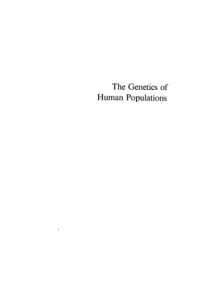
Ebook: The Genetics of Human Populations
- Genre: Biology // Genetics
- Tags: human genetics population genetics evolution selection mutation blood groups transplantation antigens organ transplants HL-A demography inbreeding inbreeding depression consanguinity recessives genetic drift isolation by distance speciation quantitative genetics threshold characters binary traits liability threshold model polygenic sex differences Y-linkage sex ratio R.A. Fisher sexual dimorphism twin studies racial differences ancestry phylogenetics gene flow an
- Series: A Series of Books in Biology
- Year: 1971
- Publisher: W.H. Freeman and Company
- Language: English
- djvu
"This text coauthored with Walter F. Bodmer, _The Genetics of Human Populations_, is one of the most thorough introductions to the field of population genetics with an emphasis on our own species."
"Comprehensive, advanced treatment of the nature and source of inherited characteristics, and mathematical techniques of population genetics. Mendelian populations, mutations, polymorphisms, genetic demography and natural selection, inbreeding, sexual dimorphism and human evolution, eugenics, euphenics, more. Emphasis on interpretation of data in relation to theoretical models. Minimal math background required."
"The study of population genetics is an important factor in a broad range of fields, including medical genetics, public health, physical anthropology, sociology, and psychology. That is the premise underlying this thorough, advanced treatment of the nature and source of inherited characteristics, which provides the reader with a sound introduction to population genetics, including the mathematical techniques useful in this discipline. Prior to the publication of this book, no comprehensive treatment of the genetics of human populations emphasized the interpretation of data in relation to the theoretical models. This book fills the need for such a treatment.
Beginning with the basic concepts of genetics, the authors - both world famous geneticists - advance to discussions of Mendelian populations, mutations, transient and balanced polymorphisms, genetic demography and natural selection, and inbreeding. A review of population structure (focusing on genetic drift and migration) is followed by chapters on sexual dimorphism and human evolution; the book concludes with an examination of eugenics, euphenics, and human welfare.
The authors presume only a minimal background in mathematics, but they have provided additional material for readers with more extensive training in mathematical probability, segregation, and linkage analysis in human pedigrees and the estimation of gene frequencies, and sample problems. The result is an exceptionally advanced and comprehensive treatment of the subject that ranks as one of the standard teaching and reference works in its field."
"Comprehensive, advanced treatment of the nature and source of inherited characteristics, and mathematical techniques of population genetics. Mendelian populations, mutations, polymorphisms, genetic demography and natural selection, inbreeding, sexual dimorphism and human evolution, eugenics, euphenics, more. Emphasis on interpretation of data in relation to theoretical models. Minimal math background required."
"The study of population genetics is an important factor in a broad range of fields, including medical genetics, public health, physical anthropology, sociology, and psychology. That is the premise underlying this thorough, advanced treatment of the nature and source of inherited characteristics, which provides the reader with a sound introduction to population genetics, including the mathematical techniques useful in this discipline. Prior to the publication of this book, no comprehensive treatment of the genetics of human populations emphasized the interpretation of data in relation to the theoretical models. This book fills the need for such a treatment.
Beginning with the basic concepts of genetics, the authors - both world famous geneticists - advance to discussions of Mendelian populations, mutations, transient and balanced polymorphisms, genetic demography and natural selection, and inbreeding. A review of population structure (focusing on genetic drift and migration) is followed by chapters on sexual dimorphism and human evolution; the book concludes with an examination of eugenics, euphenics, and human welfare.
The authors presume only a minimal background in mathematics, but they have provided additional material for readers with more extensive training in mathematical probability, segregation, and linkage analysis in human pedigrees and the estimation of gene frequencies, and sample problems. The result is an exceptionally advanced and comprehensive treatment of the subject that ranks as one of the standard teaching and reference works in its field."
Download the book The Genetics of Human Populations for free or read online
Continue reading on any device:

Last viewed books
Related books
{related-news}
Comments (0)